A long and complex attack on one of the most sensitive prisons in the Middle East. Islamic State targeted the Al-Sinaa detention center in Hassaké (Al-Hasakah in Arabic), in northeastern Syria under Kurdish control, overnight from Thursday to Friday. The attack continued this Friday afternoon near the prison where around 3,500 Islamic State jihadists are detained, including former leaders of the organization and French people.
Visibly coordinated, the attack began with the explosion of a car bomb before fighters took over. “Members of Daesh sleeper cells sprung up from surrounding neighborhoods and clashed with security forces,” declared the Syrian Democratic Forces (SDF) which depends on the Kurdish authorities. According to the Syrian Observatory for Human Rights, prisoners were able to escape, which the FDS did not confirm. The Information Center of Rojava (name given by the Kurds to this region) for its part affirmed that 89 detainees had been taken back to “immediate proximity” from prison and that six had escaped.
Escape attempts and mutinies are not uncommon in Al-Sinaa. Several took place, especially in the summer of 2020. But none had the magnitude of this one. At least seven members of the FDS and one of the Assayish, equivalent to the police, were killed, as well as 23 jihadists, according to a military source quoted by Reuters. The American army, which still has special forces in the region, had to send combat helicopters.
The prison filled up in the spring of 2019, as Daesh’s last enclave in eastern Syria, Al-Baghouz, was taken over by the SDF and the international coalition after weeks of shelling and fighting. The Kurdish authorities now hold around 12,000 jihadists of around fifty nationalities in around twenty detention centers spread over their territory.
With rare exceptions, such as the United States, the countries from which they originate refuse to repatriate them. Like France, they affirm that they must be judged where they committed their crimes – the argument does not hold, the Kurds do not have a judicial system capable of organizing so many trials. The hypothesis of an international tribunal, which remains to be set up in an area still at war, does not constitute a solution either, Syrian Kurdistan not being a State, but an autonomous region led by the Party of Democratic Union (PYD), Syrian version of the Turkish Kurdistan Workers’ Party (PKK).
Jihadists still active between Homs and Deir el-Zor
Daesh, for its part, has made the release of its prisoners a priority. In September 2019, a month before he was killed by US forces in Idlib, northwestern Syria, the organization’s leader Abu Bakr al-Baghdadi urged his supporters to “do everything possible to free [les membres détenus] and demolish the walls that restrict them”.
Now without territory, the jihadists of the Islamic State remain active in the desert which extends from Homs (in the center of the country) to Deir el-Zor (in the southeast), attacking Syrian soldiers, forces Kurds and oil installations. On January 6, the international coalition stated in a press release: “Daesh still poses an existential threat in Syria and it cannot be allowed to regenerate.”
